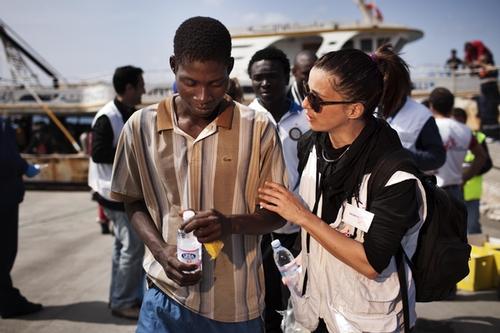Introduction
Since the popular uprisings and violent confrontations that have shaken the Arab world began in December 2010, some 27,000 refugees, asylum seekers, and undocumented migrants from North Africa,; have arrived by sea on the southern Italian island of Lampedusa. The majority of boats that arrived originated from Tunisia, but increasingly boats brought people from Libya seeking refuge – culminating in one of the largest single landings the island has ever seen, with 760 people in one boat arriving on April 19th 2011.
Many of those arriving from Libya are sub-Saharan Africans, mainly from Eritrea, Somalia, Sudan, or Nigeria. These people had already fled their own countries, seeking the means to survive or to find safety away from war or violence. They were then forced to flee the conflict in Libya.
All the refugees, asylum seekers, and migrants landing in Lampedusa, whether departing form Libya, Tunisia, or elsewhere, have risked an often perilous sea journey to reach Italy. They do so as part of their attempt to find a way to survive, escaping precarious and often insecure living situation either in their home countries or in North African countries where they had also sought a means of survival. Some speak of having been victims of detention, rape, and torture, or targeted as foreigners in the current or recent violence in North Africa; others are particularly vulnerable people, such as unaccompanied minors and women travelling alone.
The reception conditions for these refugees and migrants on Lampedusa are generally poor and fail to meet the minimum standards for reception of vulnerable persons, which leads to renewed suffering and uncertainty. There is inadequate separation between men and women; overall poor living conditions in reception centres; lack of access to information about rights; lack of suitable measures for the most vulnerable groups, including victims of torture and violence, unaccompanied minors and women.
Médecins Sans Frontières (MSF) has worked in Italy since 1999 at landing points and in open settings to provide medical care and mental health support to refugees, asylum seekers and migrants arriving. The organisation has repeatedly called attention to the appalling reception and living conditions facing this population upon their arrival— and the far-reaching impact on their physical and mental health.
Since February 2011, MSF has conducted 765 medical consultations for migrants and refugees in Lampedusa, and has provided them with a total of 2,500 hygiene kits and 4,500 blankets, and 2,500 bottle of water. After witnessing the inadequate and appalling reception conditions in Italy, MSF is compelled to speak out again about the failure to provide assistance and protection to those fleeing from North Africa, many of whom have experienced violence and torture.
Lampedusa has in the past faced regular arrivals of refugees, asylum-seekers and migrants by sea. This year, is no exception. Clearly, Italy can anticipate new arrivals, possibly in increased numbers due to the ongoing uprisings in the Arab world, so it is imperative that the country takes its responsibility to ensure adequate, humane reception conditions for people who have fled there in order to survive or to escape violence.
The new arrivals on Lampedusa face vulnerability that goes beyond the need for medical care and material assistance. It is also the responsibility of the Italian state to ensure adequate reception conditions and provide information and access to legal procedures and protection.




